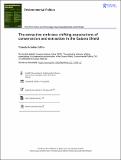Files in this item
The extractive embrace : shifting expectations of conservation and extraction in the Guiana Shield
Item metadata
| dc.contributor.author | Collins, Yolanda Ariadne | |
| dc.date.accessioned | 2021-08-27T15:30:05Z | |
| dc.date.available | 2021-08-27T15:30:05Z | |
| dc.date.issued | 2021-08-27 | |
| dc.identifier | 275213018 | |
| dc.identifier | 02e0a8bb-4609-42b8-85a5-427f82812b51 | |
| dc.identifier | 85113636659 | |
| dc.identifier | 000690303300001 | |
| dc.identifier.citation | Collins , Y A 2021 , ' The extractive embrace : shifting expectations of conservation and extraction in the Guiana Shield ' , Environmental Politics , vol. Latest Articles . https://doi.org/10.1080/09644016.2021.1959122 | en |
| dc.identifier.issn | 0964-4016 | |
| dc.identifier.other | ORCID: /0000-0003-4138-9158/work/104252844 | |
| dc.identifier.uri | https://hdl.handle.net/10023/23854 | |
| dc.description.abstract | This paper demonstrates what the Reducing Emissions from Deforestation and forest Degradation (REDD+) initiative would have to do to satisfy the expectations of its diverse, local stakeholders. It connects the unmet expectations of REDD+ with a deepening reliance on extractive activity in the Guiana Shield. In it, I argue that extractive activity, which has always been the most significant driver of deforestation in the ecoregion, is further overtaking REDD+’s capacity for meeting expectations and development aspirations due to the combined failure of REDD+ to deliver vast amounts of promised funding to alter unsustainable development paths and the subsequent announcements of major oil discoveries in the territorial waters of the Guiana Shield. These arguments are based on data collected in the early phases of REDD+ readiness through a multi-sited ethnography, analyzed through a combination of Foucauldian discourse analysis and governmentality. I use critical discourse analysis to represent REDD+’s regional interpretations and governmentality to tease out the expectations embedded in these discourses. This combination supports my identification of what REDD+ would have to accomplish to be deemed successful in Guyana and Suriname, the only two REDD+ participating countries entirely within the Guiana Shield. In turn, this identification improves understandings of the relationship between failed or failing conservation and development initiatives and the subsequent intensification of extractive activity. | |
| dc.format.extent | 23 | |
| dc.format.extent | 2056832 | |
| dc.language.iso | eng | |
| dc.relation.ispartof | Environmental Politics | en |
| dc.subject | REDD+ | en |
| dc.subject | Forests | en |
| dc.subject | Guiana Shield | en |
| dc.subject | Governmentality | en |
| dc.subject | Discourse | en |
| dc.subject | Guyana | en |
| dc.subject | Suriname | en |
| dc.subject | JZ International relations | en |
| dc.subject | T-NDAS | en |
| dc.subject.lcc | JZ | en |
| dc.title | The extractive embrace : shifting expectations of conservation and extraction in the Guiana Shield | en |
| dc.type | Journal article | en |
| dc.contributor.institution | University of St Andrews. Centre for Global Law and Governance | en |
| dc.contributor.institution | University of St Andrews. School of International Relations | en |
| dc.identifier.doi | https://doi.org/10.1080/09644016.2021.1959122 | |
| dc.description.status | Peer reviewed | en |
This item appears in the following Collection(s)
Items in the St Andrews Research Repository are protected by copyright, with all rights reserved, unless otherwise indicated.

